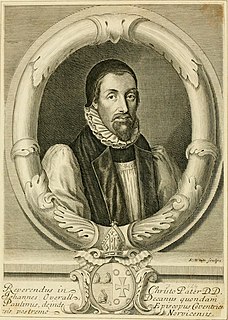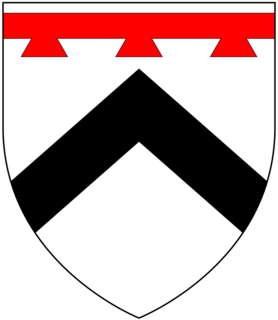Related Research Articles
Henry Briggs was an English mathematician notable for changing the original logarithms invented by John Napier into common logarithms, which are sometimes known as Briggsian logarithms in his honour. The specific algorithm for long division in modern use was introduced by Briggs c. 1600 AD.

John Flavel (c.1627–1691) was an English Puritan Presbyterian minister and author.

John Fletcher (1579–1625) was a Jacobean playwright. Following William Shakespeare as house playwright for the King's Men, he was among the most prolific and influential dramatists of his day; during his lifetime and in the early Restoration, his fame rivalled Shakespeare's. He collaborated on writing plays with Francis Beaumont, and also with Shakespeare on three plays.

Marco Antonio de Dominis was a Dalmatian ecclesiastic, archbishop of Split and Primate of Dalmatia and all Croatia, adjudged heretic of the Catholic faith, and man of science.
George Downame, otherwise known as George Downham, was an author of influential philosophical and religious works who served as Bishop of Derry during the early years of the Plantation of Ulster. He is said to have been a chaplain to both Elizabeth I and James I.

John Overall (1559–1619) was the 38th bishop of the see of Norwich from 1618 until his death one year later. He had previously served as Bishop of Coventry and Lichfield, as Dean of St Paul's Cathedral from 1601, as Master of Catharine Hall from 1598, and as Regius Professor of Divinity at Cambridge University from 1596. He also served on the Court of High Commission and as a Translator of the King James Version of the Bible.

Sir Wadham Wyndham, of Ilton, Somerset and St. Edmund’s College, Salisbury, was a Justice of the King's Bench from 1660 to 1668.

John Prideaux was an English academic and Bishop of Worcester.

Ralph Bathurst, FRS was an English theologian and physician.
Rowland Searchfield (Roland) was an English academic and bishop.
Richard Crakanthorpe (1567–1624) was an English Anglican priest, remembered both as a logician and as a religious controversialist.
Robert Pink D.D. was an English clergyman and academic, a supporter of William Laud as Warden of New College, Oxford, and later a royalist imprisoned by Parliament.
John Parkhurst (1564–1639) was an English clergyman and academic, master of Balliol College, Oxford, from 1617.
Francis Dee was an English churchman and Bishop of Peterborough from 1634.
George Meriton was an English churchman, Dean of Peterborough in 1612 and Dean of York in 1617.

Gilbert Ironside the younger was an English churchman and academic, Warden of Wadham College, Oxford, from 1667, Bishop of Bristol and Bishop of Hereford.
Alexander Huish (1594?–1668) was an English cleric, academic and biblical scholar.
Edward Lapworth (1574–1636) was an English physician and Latin poet, and the first Sedleian reader at the University of Oxford.
John Gee (c.1596–1639) was an English Church of England cleric. A survivor of the Fatal Vespers disaster, at a time when he was involved in clandestine Roman Catholic religious activity, he then became a writer against Catholics.
References
- Attribution
![]() This article incorporates text from a publication now in the public domain : Stephen, Leslie, ed. (1889). "Flavel, John (1596-1617)". Dictionary of National Biography . Vol. 19. London: Smith, Elder & Co.
This article incorporates text from a publication now in the public domain : Stephen, Leslie, ed. (1889). "Flavel, John (1596-1617)". Dictionary of National Biography . Vol. 19. London: Smith, Elder & Co.